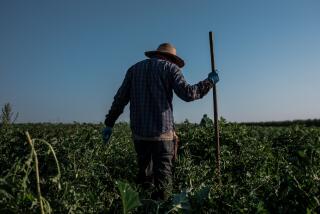Buccaneering and the Farms
- Share via
The Department of Agriculture has announced a $2-billion farm export subsidy program in what seems to be a reckless abandonment of important principles of trade and agriculture policy. The decision places at risk both the global effort to facilitate trade and a new effort in the United States to put the domestic farm program on a more rational basis.
Secretary of Agriculture John R. Block has defended the proposal as part of a carefully targeted effort to gain a foothold in markets where unnamed foreign competitors have gained a foothold through unfair trading practices. But he knows as well as the American farmers and exporters that there already are remedies for unfair practices, and that orderly competition will only be made more difficult with this buccaneer approach.
The subsidy program looks like a poorly disguised move to appease farm-state senators who supported a budget that may lack enough dollars to help farmers through the painful transition to a market-oriented farm economy. But they must know that bonuses to exporters cannot significantly reverse declining farm exports. That depends on changes in the monetary market, where the strong American dollar makes all American exports less competitive. The subsidies invite global retaliation that could make matters much worse for all exporters while complicating efforts to win global trade agreements.
The crisis of American agriculture is due in large part to bad legislation--farm laws that have contributed to declining competitiveness in the world market and tax laws that have been incentives for destructive investments. That reality was demonstrated in a recent survey of the paradoxes of U.S. farm legislation by our staff writer, Larry Green.
The interdependence of farm and tax legislation and trade policy is evident.
In drawing up a new farm bill to replace the 1981 act that will expire at the end of this year there is a priority above all others, and that is to make farm assistance an instrument of reinforcing market influences--not distorting them. Loan rates, price supports, whatever government interventions are required, must be at market-clearing levels--that is, based on the market price.
Farmers will need lots of help over the next five years in the painful transition to a market-oriented and less protected situation, but even in transition the government programs must be drawn so as not to damage the ability of farmers to compete in the international market that is now controlling. Exports account for close to half of American farm production. A failure to compete in the world market would be disastrous. But competition is distorted by subsidies, and markets also can be skewed and depressed even more by this program that will use surplus commodities as the subsidy.
Tax-law reform is as important for American agriculture as writing the new farm bill. Congress needs to produce a situation of fairness to working farmers. Special tax provisions should be limited to special cases of demonstrated national urgency. Tax shelters for hobbyist farmers should be eliminated. Tax incentives for investments in farming enterprises of questionable economic value, many of which have plundered scarce resources in water and erosion-prone land, also should be eliminated.
There are some things that members of Congress cannot do much about at this moment. The high value of the dollar is the single greatest obstacle to export sales of farm commodities. Relatively high interest rates continue to make farm operations more difficult, farm debt more burdensome. Only as the Administration deals realistically with the deficit in the federal budget by accepting tax increases as well as budget cuts can there be progress on those fundamental issues.
But there is much that Congress can do to improve the state of American farmers. The answer is not a perpetuation of programs that have fueled surpluses and inflated prices. The need is for legislation based on market forces, accompanied by tax-law reforms that eliminate the incentives for distortion in the farm economy.
And there is much that the Administration can do. The pursuit of fair-trade practices is among them. But just as protectionism is counterproductive, so also are export subsidies. As Block himself acknowledged, “It’s not the long-range best solution for agriculture.” He would have been more honest had he added that it is also a bad short-term response.
More to Read
Get the L.A. Times Politics newsletter
Deeply reported insights into legislation, politics and policy from Sacramento, Washington and beyond. In your inbox twice per week.
You may occasionally receive promotional content from the Los Angeles Times.






